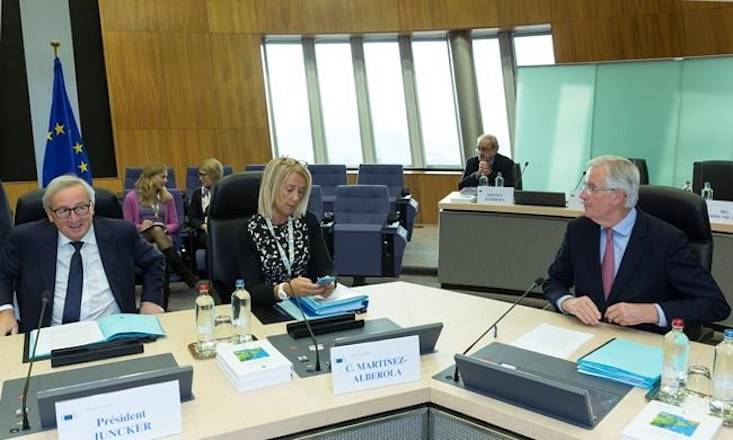The European Union and Britain have agreed a draft declaration on their future relations after Brexit, European Council President Donald Tusk said Thursday, a development that paves the way for an EU summit this weekend to rubber-stamp the deal.
The 26-page draft declaration was agreed upon at a technical level by negotiators and endorsed Thursday by the European Commission, the EU’s executive arm, which is overseeing Brexit negotiations.
“The (EU) Commission President has informed me that it has been agreed at negotiators’ level and agreed in principle at political level,” Tusk said in a tweet.
Tusk, who chairs meetings of EU leaders, said he has sent the draft political declaration to Britain’s 27 European partners and that it till requires “the endorsement of the leaders.”
EU heads of state and government are due to meet in Brussels on Sunday to approve the declaration and a separate divorce deal. British Prime Minister Theresa May is set to return to Brussels on Saturday for more talks on the eve of the summit, including with Commission President Jean-Claude Juncker.
Representatives from all 28 EU countries are due to meet Friday to prepare for the summit, which is seen as a pivotal moment in the Brexit process.
Read more: British, EU leaders to meet as Brexit deadline looms
Read more: UK’s May appeals to public on Brexit, braces for more blows
May is facing widespread opposition in the British Parliament over the divorce agreement, which was agreed last week. That 585-page legal treaty deals with the terms of Britain’s departure, including what the country owes the EU.
Britain officially leaves the EU — the first country ever to do so — on March 29, 2019, but a withdrawal agreement needs to be sealed soon to leave enough time for the European Parliament and the U.K. parliament to endorse it.
As opposed to the withdrawal agreement, the draft declaration on future ties is a political, not a legal, text.
“This declaration establishes the parameters of an ambitious, broad, deep and flexible partnership across trade and economic co-operation, law enforcement and criminal justice, foreign policy, security and defence and wider areas of co-operation,” according to the document.
It also talks about the close ties that have been cemented after 45 years of Britain’s membership of the EU as well as “the sizes of the two economies and their geographic proximity, which have led to complex and integrated supply chains.”
It notes that the “parties envisage having a trading relationship on goods that is as close as possible, with a view to facilitating the ease of legitimate trade.”
The actual legal text will have to be negotiated after Brexit on March 29, and that could well be even more complicated than what has come so far.
In a speech in Berlin before Tusk’s announcement, German Chancellor Angela Merkel underlined that “Britain should remain a partner, remain a friend.”
Though Britain “should have very close economic relations with us,” Merkel did underscore the difficulties that may arise in any attempt to keep services seamless.
“We have to say honestly that, in the services sector, we don’t have a great deal of experience with international free trade agreements,” she said.
“But we want to see that as a future relationship.”
The European Commission, which has supervised Brexit negotiations, refused to comment directly on the declaration.
Spokesman Margaritis Schinas said any running commentary could “have a negative impact as negotiations are now going into their last stretch.”
He did confirm that “work is continuing” to resolve differences between London and Madrid over Gibraltar, the tiny territory at the tip of the Iberian Peninsula that was ceded to Britain in 1713 but is still claimed by Spain.
“There are ideas, contacts are ongoing,” Schinas said, without providing further details.
Last year’s EU guidelines on the Brexit negotiations effectively gave Spain veto powers over future relations between the bloc and the British overseas territory, and the Spanish government says it will vote against the Brexit deal if Gibraltar’s future isn’t considered a bilateral issue between Madrid and London.
Spanish Prime Minister Pedro Sanchez said Tuesday that his government “cannot accept” Gibraltar’s future being determined by negotiations at the EU level.
May has said that “we will not exclude Gibraltar from our negotiations on the future relationship.”
Spain’s EU Affairs State Secretary, Luis Marco Aguiriano, has said there is still time to “legally clarify” the agreement before Sunday.
In London, May is due to address lawmakers later Thursday and hold talks with Austrian Chancellor Sebastian Kurz, whose country holds the rotating EU presidency until the end of the year.
Kurz told the Austria Press Agency that his trip to London is designed to help May build support for the deal and that he hopes to get a “realistic picture” about May’s chances of getting Parliament’s backing.
___
Gregory Katz in London and Geir Moulson in Berlin contributed to this report.
___
Lorne Cook, The Associated Press



